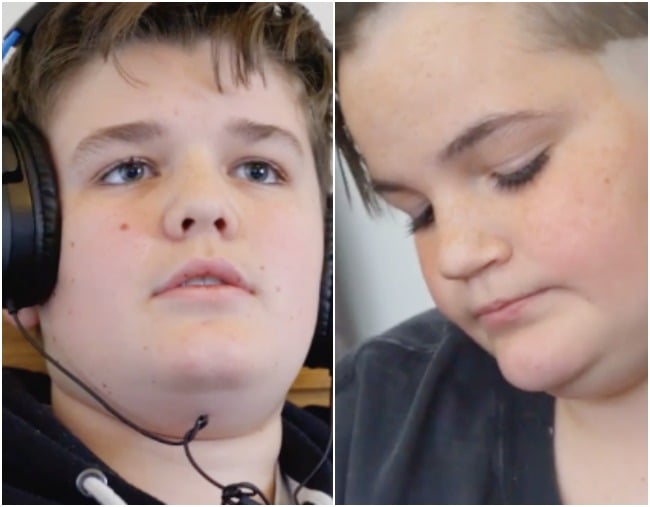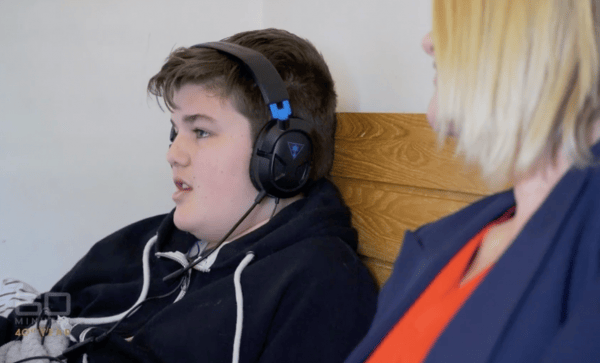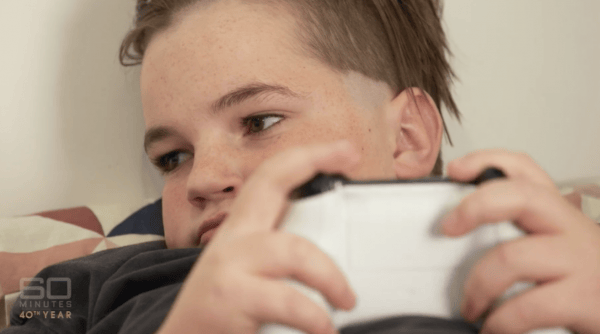
Last night, 60 Minutes Australia featured two boys who are addicted to the online game Fortnite, in a segment called “Won’t stop, can’t stop.”
Many Australians who saw it agreed that it was heartbreaking to watch.
The boys, Logan, 14, and Sam, 13, haven’t attended school for as long as two years because they are gaming in their bedrooms. They throw tantrums and abuse and hurt their parents when the game is removed from them.
They are not happy children; the game brings them no joy. Instead, they are isolated from life, and very lonely.
The boys are prisoners in their homes, held hostage by the highly addictive game, which has more than 125 million players worldwide.
And as journalist Tara Brown discovered, Logan’s and Sam’s parents don’t know how to help them.
Logan’s mother, Britta Hodge, tells Brown said she has been head-butted, bitten, concussed and forced to call the police when Logan violently reacts to having the game removed.
It is clear that Logan can barely hold a sentence when he’s gaming. He tells us that he only sees his school truancy as a problem because his parents will get into trouble for keeping him home from school.
But then, he also admits he turned to gaming to cope with his parents’ marriage ending.
“I was depressed and I started playing games and it just made me feel happy again,” he says.




Top Comments
I've never read such crap in my life. Parents being held hostage by a couple of little boys. Gaming addiction? Is this another new word spawned by the technological revolution? How about calling it "parental neglect" or "dysfunctional parenting" - words which we already know the clear meaning of. These boys need to be taken out behind the woodshed with a willow switch. A little old-fashioned reminder of who are the PARENTS in the home. Too many people reproduce without doing some research first. They think if they change diapers and feed bottles of milk, that their input is sufficient. After that, little Johnny will grow, meet his milestones and forge ahead in life. Unfortunately, it takes a little more parental involvement than that. Apart from role modelling with your own life, you also have to have constant input and supervision, and sometimes a heavy hand ready to guide these kids through the alligator-infested waters of life. Gaming is a fact of life now, the equipment is out there for purchase, and it becomes a CHOICE parents have to make as to how much/little they are willing to have their kids involved. Gaming involvement is not mandatory, believe it or not. I don't care if every kid in the neighborhood is doing it, if it isn't something that fits in with your family values or goals for your children, you do not have to take part in it. Kids who cry, throw tantrums, and physically abuse their parents when they don't get their way should not be able to hide behind some convoluted psychological diagnosis - they are SPOILED BRATS, in plain English, something we all understand. These parents need to take back control IMMEDIATELY, with whatever that involves. Get the gaming equipment out the door - sell it, storage it, give it away...........just get it out of sight. The boys need to return to school, take whatever remedial classes they need to take, start seeing a counsellor to figure out where their lives went off the rails, and start rebuilding a family with their parents. Divorce is survivable - hundreds of thousands of children, including mine, have been through it and come out the other end as productive, educated adults. It is a mistake to allow children to crawl into a cave and become immobile, to be witness to the ugliness of their parents' marriage breakup. All fighting, name calling, mud slinging, threatening - done by parents should be done in private, away from the children. Divorce may be inevitable but it doesn't have to be carried out in public. Remember this: PARENTS DIVORCE EACH OTHER - THEY DO NOT DIVORCE THEIR CHILDREN. Keep that stuff away from them; learn how to co-parent like civil human beings.
The family who didn't want to upset the neighbours really annoyed me. They just don't want to deal with conflict. Parenting requires conflict or you're not doing justice to your child. The parent's lack of intervention constitutes child abuse in my opinion.